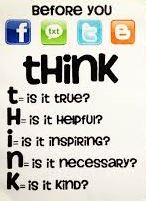"THINK" Before You Post
Are you aware of the digital footprint you are leaving when you go online? Think about the last thing you did on the internet. Was it a post on Facebook, Twitter or Instagram? Were you shopping on Amazon or another online store? Maybe you were searching for a recent news story that you had heard about on your way to work/school this morning. Whatever the action was, it left a digital footprint that can be traced, searched, copied and shared by anyone.
So why is knowing your digital footprint critical? Because it can impact your future no matter your age. The content you post or share online can potentially change a person’s perception of you. Students who apply to join school clubs, athletic teams or even moving onto college could lose an opportunity if a digital footprint was misconstrued or misrepresented their personal image. It can impact a new job whether you are trying to advance in your current career or change careers altogether. Future employers can search your name and learn about you even before your first interview. What your footprint says about you could either land you your dream job or cost you that first interview. We all need to be mindful of what we are posting as far as pictures, videos, comments or ideas. These all leave traces of who we are and can be perceived differently by anyone, potentially ruining your reputation. However, it can certainly help you land that perfect job or get you into the top college if you leave the right digital footprint. Let’s go through a few tips for creating that positive digital footprint.
Tip 1 - Teachers and parents should discuss, model and teach proper posting on the web. Discussing digital citizenship and internet safety should be a daily conversation if students are using the device every day.
Tip 2 - Provide students with opportunities to practice posting online. This could be on social media, blogging or commenting or adding videos to YouTube. As an educator, it’s good practice to inform your parents about what they will be doing in class and the purpose. It is also good practice for teachers to read the terms of service and privacy settings in order to inform your parents of what can be seen or shared on these social media sites. I encourage you to talk to your administrator or Technology and Learning Coaching to see if there are social media guidelines, consent forms or opt-out forms that are currently being used to ensure you are following proper procedures and policies. Common Sense Media has created a “Family Media Agreement” for each level. This may help in starting the conversation with school and parents. Getting parent permission for students posting/sharing online is a safe habit. If you have younger early elementary students create a safe space to practice, such as SeeSaw. This platform builds a digital portfolio for each student to showcase their work, express their understanding of content, reflect on their learning and have it “closed” to just the specific classroom and respective parents can see the work and leave comments for their child.
Tip 3 - While I taught 5th grade I coached my students to “THINK” before they spoke. If you teach elementary, you have a lot of tattle tailing that can lead to bigger issues. I just helped my students to process what they were going to say before you say it because once it is verbal, you cannot take it back. This is absolutely true in the digital world. I think it is a strategy we could use for reminding ourselves and students to “Think” before they click/share.

T - is it true?
H - is it helpful?
I - is it inspiring?
N - is it necessary?
K - is it kind?
Tip 4: So, what happens when an incident comes up in your classroom about an inappropriate post on a social media site or you see it in your Google Classroom? Have a conversation with the student about the post and its repercussions on their reputation. The fact that one negative comment or post made will now need to be replaced by positive ideas, that student should start with a public apology to learn from his or her mistake.
Social media is becoming an integral part of our students' lives. I’m not sure they truly realize the significance of what they say, post or share online impacts them now AND follow you for life. So, as educators and parents, we need to be true digital citizens and discuss, model and teach responsible use of any and all online behavior. This year make a pledge to provide your students with opportunities to practice and learn so they can grow to be good digital citizens.
So why is knowing your digital footprint critical? Because it can impact your future no matter your age. The content you post or share online can potentially change a person’s perception of you. Students who apply to join school clubs, athletic teams or even moving onto college could lose an opportunity if a digital footprint was misconstrued or misrepresented their personal image. It can impact a new job whether you are trying to advance in your current career or change careers altogether. Future employers can search your name and learn about you even before your first interview. What your footprint says about you could either land you your dream job or cost you that first interview. We all need to be mindful of what we are posting as far as pictures, videos, comments or ideas. These all leave traces of who we are and can be perceived differently by anyone, potentially ruining your reputation. However, it can certainly help you land that perfect job or get you into the top college if you leave the right digital footprint. Let’s go through a few tips for creating that positive digital footprint.
Tip 1 - Teachers and parents should discuss, model and teach proper posting on the web. Discussing digital citizenship and internet safety should be a daily conversation if students are using the device every day.
Tip 2 - Provide students with opportunities to practice posting online. This could be on social media, blogging or commenting or adding videos to YouTube. As an educator, it’s good practice to inform your parents about what they will be doing in class and the purpose. It is also good practice for teachers to read the terms of service and privacy settings in order to inform your parents of what can be seen or shared on these social media sites. I encourage you to talk to your administrator or Technology and Learning Coaching to see if there are social media guidelines, consent forms or opt-out forms that are currently being used to ensure you are following proper procedures and policies. Common Sense Media has created a “Family Media Agreement” for each level. This may help in starting the conversation with school and parents. Getting parent permission for students posting/sharing online is a safe habit. If you have younger early elementary students create a safe space to practice, such as SeeSaw. This platform builds a digital portfolio for each student to showcase their work, express their understanding of content, reflect on their learning and have it “closed” to just the specific classroom and respective parents can see the work and leave comments for their child.
Tip 3 - While I taught 5th grade I coached my students to “THINK” before they spoke. If you teach elementary, you have a lot of tattle tailing that can lead to bigger issues. I just helped my students to process what they were going to say before you say it because once it is verbal, you cannot take it back. This is absolutely true in the digital world. I think it is a strategy we could use for reminding ourselves and students to “Think” before they click/share.

T - is it true?
H - is it helpful?
I - is it inspiring?
N - is it necessary?
K - is it kind?
Tip 4: So, what happens when an incident comes up in your classroom about an inappropriate post on a social media site or you see it in your Google Classroom? Have a conversation with the student about the post and its repercussions on their reputation. The fact that one negative comment or post made will now need to be replaced by positive ideas, that student should start with a public apology to learn from his or her mistake.
Social media is becoming an integral part of our students' lives. I’m not sure they truly realize the significance of what they say, post or share online impacts them now AND follow you for life. So, as educators and parents, we need to be true digital citizens and discuss, model and teach responsible use of any and all online behavior. This year make a pledge to provide your students with opportunities to practice and learn so they can grow to be good digital citizens.



Comments
Post a Comment